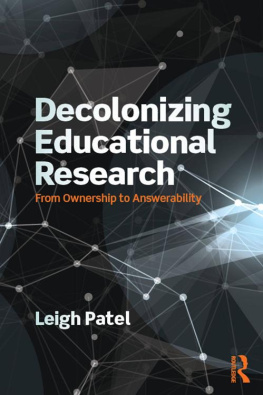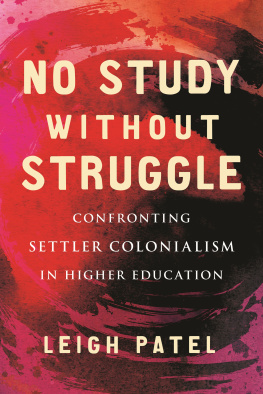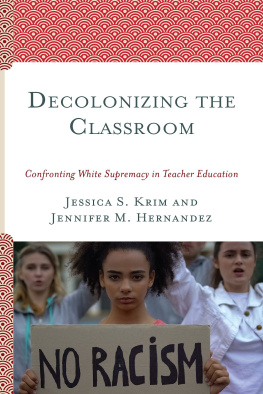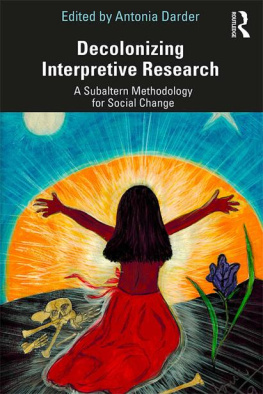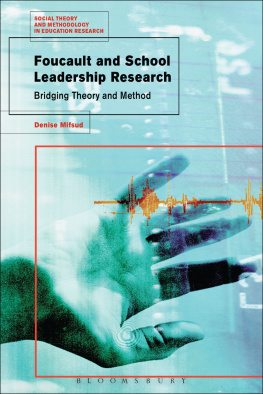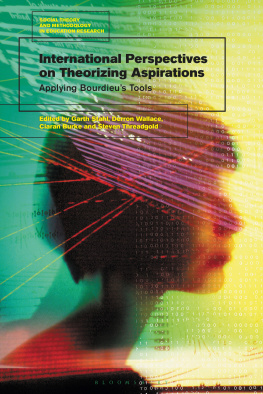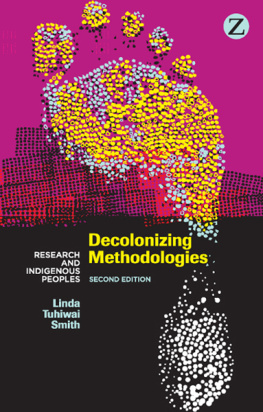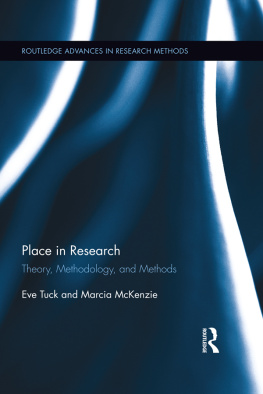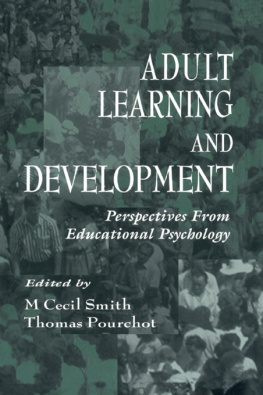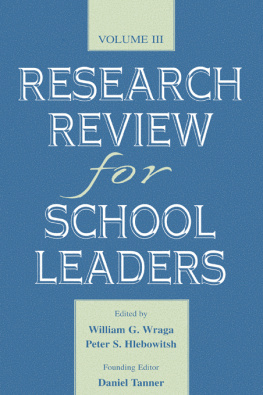DECOLONIZING EDUCATIONAL RESEARCH
Decolonizing Educational Research examines the ways through which coloniality manifests in contexts of knowledge and meaning making, specifically within educational research and formal schooling. Purposefully situated beyond popular deconstructionist theory and anthropocentric perspectives, the book investigates the long-standing traditions of oppression, racism, and white supremacy that are systemically reseated and reinforced through societal institutions. Through these meaningful explorations into the unfixed and often interrupted narratives of culture, history, place, and identity, a bold, timely, and hopeful vision emerges to conceive of how research in secondary and higher education institutions might break free of colonial genealogies and their widespread complicities.
Leigh Patel is Associate Professor of Education in the Department of Teacher Education/Special Education, Curriculum and Instruction at the Lynch School of Education, Boston College, USA.
Series in Critical Narrative
Donaldo Macedo, Series Editor
University of Massachusetts Boston
Now in Print
The Hegemony of English
by Donaldo Macedo, Bessie Dendrinos, and Panayota Gounari (2003)
Letters from Lexington: Reflections on Propaganda
New Updated Edition
by Noam Chomsky (2004)
Pedagogy of Indignation
by Paulo Freire (2004)
Howard Zinn on Democratic Education
by Howard Zinn, with Donaldo Macedo (2005)
How Children Learn: Getting Beyond the Deficit Myth
by Terese Fayden (2005)
The Globalization of Racism
edited by Donaldo Macedo and Panayota Gounari (2006)
Daring to Dream: Toward a Pedagogy of the Unfinished
by Paulo Freire (2007)
Class in Culture
by Teresa L. Ebert and Masud Zavarzadeh (2008)
Dear Paulo: Letters from Those Who Dare Teach
by Sonia Nieto (2008)
Uncommon Sense from the Writings of Howard Zinn (2008) Paulo Freire and the Curriculum
by Georgios Grollios (2009)
Freedom at Work: Language, Professional, and Intellectual Development in Schools
by Maria E. Torres-Guzman with Ruth Swinney (2009)
The Latinization of U.S. Schools: Successful Teaching and Learning in Shifting Cultural Contexts
by Jason G. Irizarry (2011)
Culture and Power in the Classroom: Educational Foundations for the Schooling of Bicultural Students
by Antonia Darder (2011)
Changing Lives: Working with Literature in an Alternative Sentencing Program
by Taylor Stoehr (2013)
Seeds of Freedom: Liberating Education in Guatemala
by Clark Taylor (2013)
Pedagogy of Commitment
by Paulo Freire (2014)
Latino Civil Rights in Education: La Lucha Sigue
edited by Anaida Coln-Muiz and Magaly Lavadenz (2016)
Decolonizing Educational Research: From Ownership to Answerability
by Lisa Patel (2016)
DECOLONIZING EDUCATIONAL RESEARCH
From Ownership to Answerability
Leigh Patel

First published 2016
by Routledge
711 Third Avenue, New York, NY 10017
and by Routledge
2 Park Square, Milton Park, Abingdon, Oxon OX14 4RN
Routledge is an imprint of the Taylor & Francis Group, an informa business
2016 Taylor & Francis
The right of Leigh Patel to be identified as the author of this work has been asserted by her in accordance with sections 77 and 78 of the Copyright, Designs and Patents Act 1988.
All rights reserved. No part of this book may be reprinted or reproduced or utilised in any form or by any electronic, mechanical, or other means, now known or hereafter invented, including photocopying and recording, or in any information storage or retrieval system, without permission in writing from the publishers.
Trademark notice: Product or corporate names may be trademarks or registered trademarks, and are used only for identification and explanation without intent to infringe.
Library of Congress Cataloging in Publication Data
Names: Patel, Leigh.
Title: Decolonizing educational research : from ownership to answerability / Leigh Patel.
Description: New York : Routledge, 2015. | Series: Series in critical narrative | Includes bibliographical references and index.
Identifiers: LCCN 2015025506| ISBN 9781138998711 (hardback) | ISBN 9781138998728 (pbk.) | ISBN 9781315658551 (ebook)
Subjects: LCSH: Minorities--Education (Higher)--United States. | Dissertations, Academic--United States.
Classification: LCC LC3731 .P37 2015 | DDC 378.1/982--dc23
LC record available at http://lccn.loc.gov/2015025506
ISBN: 978-1-138-99871-1 (hbk)
ISBN: 978-1-138-99872-8 (pbk)
ISBN: 978-1-315-65855-1 (ebk)
Typeset in Bembo
by Saxon Graphics Ltd, Derby
Dedication
This book is dedicated to my mother, Sharda Patel.
Thank you for teaching us how to love and trust ourselves, against odds.
Every joy and accomplishment we experience is because of you.
CONTENTS
For a milestone birthday, I asked all of the people in my life to forego presents and, instead, to handwrite one thing they were absolutely sure of from their experiences in this world. I believe that one of the very things of which I am absolutely certain is that we accomplish nothing completely individually. What follows here, then, is my best, albeit undoubtedly partial, recognition of the many people and communities that have supported me to be better able to do this work. They are all my teachers.
First and foremost, I must thank the forced migrant and Indigenous communities in Hawaii, Turtle Island, and Australia for welcoming me and teaching me how to understand their and my trajectories relative to each other. Fifteen years ago, I would have never foreseen writing this book, but that is truly when the impetus for this thinking began. It was in concert with members of those communities that I first began to understand, implicitly and then more explicitly, the always interrelated but never equivalent locations we have, and our duties therein. It was also in conversation with, sometimes in close proximity and sometimes through distal readings, that I refined the ideas presented here. Many people took an interest in the topic and led me to the readings that have been foundational to this bounded version. Specifically, Id like to thank Malia Villegas, Eve Tuck, Aileen Moreton-Robinson, Allan Luke, Linda Tuhiwai Smith, Michelle Fine, Kathy Au, Val Tsuchiya, Avis Masuda, and Anna Sumida. All of these scholars have strengthened my understanding of the core roots and purposes of coloniality.
Id also like to acknowledge the dozens of doctoral students over the years who have been conversant with me in research methods courses as we strained against the pervasive lie that there can be any knowledge or pursuit of knowledge devoid of context, power, and material impact. Such conversations require going directly against the grain of the much more ubiquitous themes of neutrality, objectivity, and best practices. I thank the many students who diverted from graduate study as career preparation to engage with research as ethically and morally bound endeavors. Specifically, Id like to thank Alex Gurn and Nick Drane for being conversants with me through early and later drafts of this work.
Writing itself is always a necessary and simultaneously arduous practice for me. I would never get far but for the fantastically knowledgeable and responsive readers, editors, and companion writers in my life. Editors Dean Birkenkamp, Catherine Bernard, and Daniel Schwartz provided plenty of encouragement, always needed, as well as smart, pointed reads of the work. Thank you to Donaldo Macedo for his early and consistent support of this work. And gratitude to my writing partner for years, Wayne Rhodes, who read draft upon draft upon draft.
Next page
